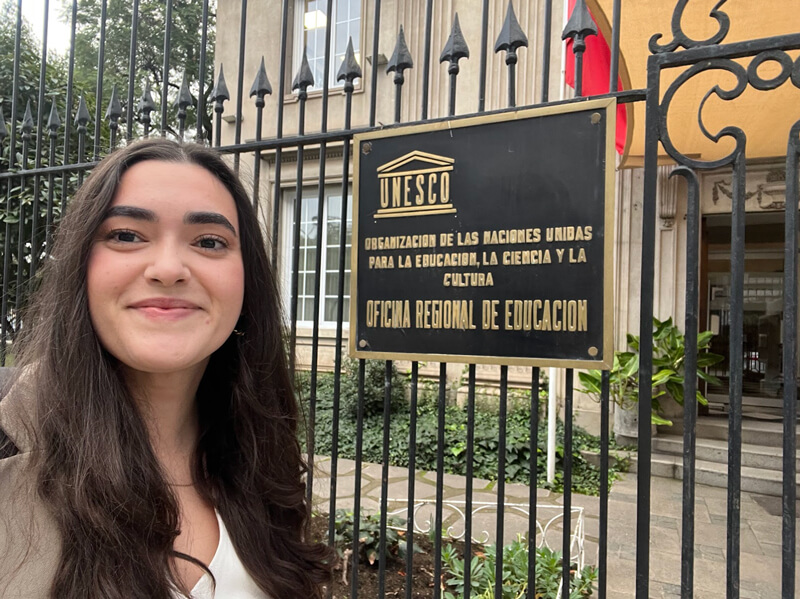After a fast turnaround to graduate from GW, leave my job at the university, and move to Chile in a bit over a week, I arrived at the airport ready to get to work. I made a strong commitment to myself before leaving the US that I would be unapologetic about showing up as my full-self in Chile and taking risks to form a community during my short time. I hadn’t anticipated that embracing my full self wouldn’t initially boost my confidence, but would rather make me more reflective about my identity, my goals and intentions, and the space I occupy in this world. My relentless dedication to self-actualize and put myself out there meant I was opening up to the possibility of being uncomfortable and criticized, but ultimately a better, more secure version of myself.

I hit the ground running linguistically before landing in Santiago, speaking Spanish with utter confidence, aware of my constant mistakes, but determined to take the risk of sounding bad. Speaking Spanish, or my inability to do so well, has been one of my biggest insecurities. As a half Puerto Rican, the judgement of not knowing Spanish has long sunk a deep sense of shame and fear of being criticized. And yet, this fellowship provided me the chance to confront this fear and just do what I could until my Spanish naturally improved. I would say I started this internship barely lower intermediate in Spanish. On the plane ride to Santiago, I was seated next to a kind, middle-aged Chilean couple, who had a limited knowledge of English. We spoke for nearly four and half hours, entirely in Spanish. I tripped over words every sentence, played charades for things I didn't know, and spoke exclusively in present tense (because I didn’t know past or future tense). By the end of the flight, we had covered every topic possible, from our families, values, politics, Chilean slang and more. The sweet wife of the couple teared up seeing photos of my family, a beautiful mix of adopted children and chaotic love. They also invited me to their home in another city and called themselves my “Chilean parents.” Taking the risk to connect with others, despite the fear of shame and sounding incompetent, meant that I got a life-long connection.
As a long-time Model UN kid, the opportunity to work for a UN body has long been a dream of mine. Once I started the prestigious internship at UNESCO ready to take risks, I asked myself, “how can I be confident, curious, and knowledgeable without coming across as too talkative and overbearing? How can I make my presence, interests, and opinions heard in this power dynamic without pushing the boundaries too much, especially as an intern?” I have studied the UN system for over a decade, making me fairly aware of the commonly known challenges (bureaucracy, elitism, etc.) that are felt throughout its system. I went in with an open-mind, excited for the work, challenges, and opportunities as a young intern. Despite my self-assurance, I have an eagerness to constantly learn, talk, reflect, and remain self-aware of my presence. I’m certainly not the most knowledgeable or even close to it, with large deficits in my Spanish language, comprehension of the Chilean and Latin American context, and the lived hardships people face on a daily basis. Ultimately, my goal has not been to climb a UN career ladder, but rather gain the deepest understanding possible of the office’s work and outcomes, colleagues opinions and lives, Spanish language, and the Chilean/Latin American landscape.
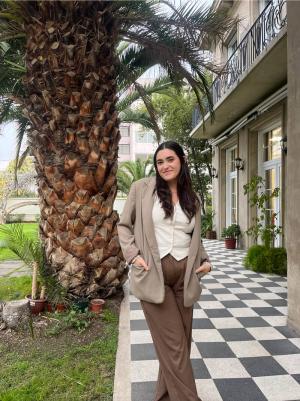
I chose the UNESCO Santiago office for its focus on inclusive education, my favorite subject of education. I was matched with two teams under the inclusive education umbrella, the refugee and migrant team, and the special education team. Unlike many roles at UNESCO that focus on research, I’m on two particularly interesting projects that are the outcome of research, but focused on practice-sharing between entities (my favorite!). I entered my first meeting with both supervisors feeling passionate about my previous experience and interests, and eagerly inquisitive about their projects’ scope, stakeholders, and goals. I tried to remain up front about my enthusiasm, ADHD, and tendency to get carried away, letting them know that they were free to pause me to speak slower or get on topic, challenge me, or give me advice. I let both of them know that if possible, I enjoyed engaging in the community and if there were opportunities to connect, I would be really grateful to do so. I left the meetings still a bit scared that I was too up front, a little too Mia too quickly and worried if they liked me. But felt that the risk of being authentic would pay off.

I would say, so far it has! On the refugee and migrant education team, I’m supporting a new UNESCO collaboration with Chilean universities, organizations, and civil society called the “Roundtable on the Inclusion of Migrant and Refugee Students in Higher Education.” This project shares immense similarity with the project I led at GW this past year with the Refugee Educational Advancement Lab (REAL). I have been studying and starting many conversations to grasp the migration context here in Chile, though I’m learning how to navigate the topic with greater sensitivity as it’s also a complex topic here, much like the US. In June, I participated in the second session of this roundtable project, which involved visiting a regional college and formulating some of the action plans for the roundtable. This week, I will present my GW projects and experience as a student leader to the third session of this roundtable. Additionally, at a Latin America UNESCO webinar on Venezuelan migrants in higher education, which brought together over 120 representatives from government, universities, and other organizations, I was entrusted to co-lead a breakout session with 18 participants. Frankly, I did a poor job keeping up linguistically and leading, relying on a colleague to take over, but I was grateful to try! My colleagues running these projects have been so respectful and considerate of my opinions, even asking for suggestions or feedback.
To my excitement, I’ve also gotten the opportunity to work with another team, the special education or inclusive education team, the field that originally sparked my passion for education. As someone with ADHD and brothers with disabilities, I have long been interested in this topic around the world, especially the Latin American context as a Latina myself. In July, I will join a knowledge exchange program between Chile, Guatemala, and Paraguay for four days, including site visits to schools and government entities. I have been so grateful for supervisors, who albeit busy, have recognized my strengths and given me unique opportunities to contribute.
Although the UN occasionally has a reputation of being far from the communities they work to serve, especially UNESCO with a more policy and research focus, I’ve been so fortunate to have had many rich community engagement opportunities. In the past month, I have both sought out and embraced opportunities to connect with the community, consistently putting myself out there despite the language barrier, cold weather, and the exhaustion that comes after work. Through my supervisor, I connected with a youth migrant organization advocating for access to education and cultural integration. I befriended the founder, an ambitious and inspirational Venezuelan college student leader, Valentina, who shares many of the same values as me and whom I got along with immediately. She has now become a cherished friend of mine, as we have supported one another through our challenging weeks. Through her foundation, Jóvenes Migrantes XDS, I have heard first hand accounts of the challenges and opportunities for migrants and refugees in Chile, finding myself in spaces of vulnerability, solidarity, and inspiration. These experiences, though limited, have made my work feel so grounded in reality.


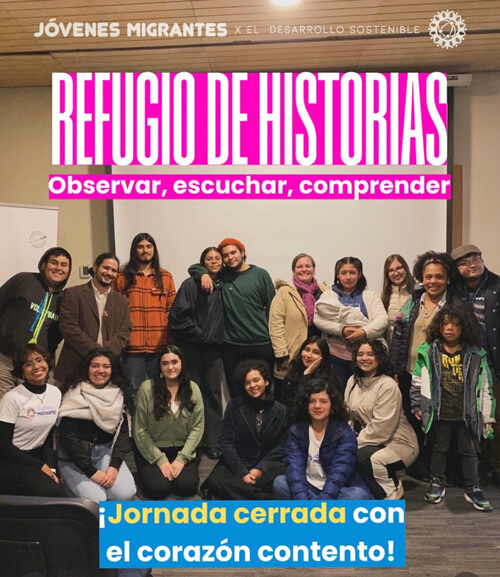
Moreover, I’ve connected with other UN agencies and personnel, attending events, crying over storytelling, and getting critical perspectives of my work.
From those networks, more have bloomed, including meeting four kind women working for the Chilean National Migration Service at a UNHCR event, who I invited to a local language exchange.
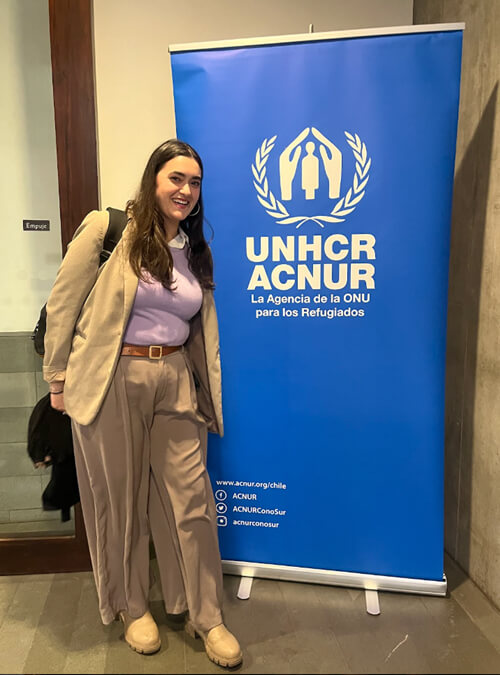
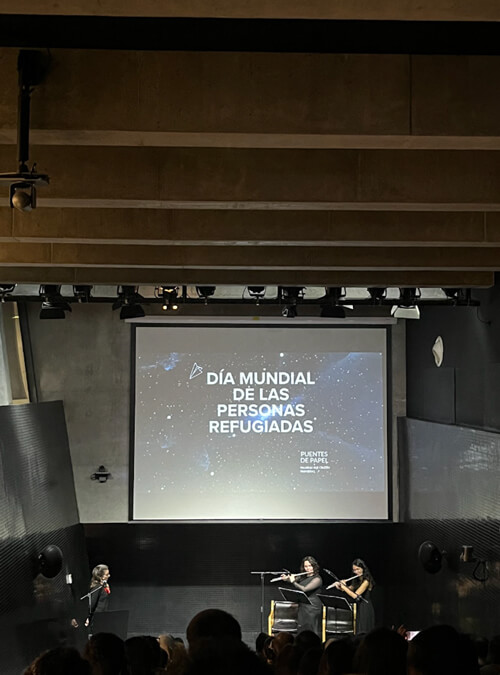

Additionally, I have found community with the three other phenomenal interns here at the UNESCO office, one of whom is Chilean. He has not only challenged some of my beliefs, but been an important person in helping me understand the political context of the country and region. The interns and I often grab lunch together, talk about our lives and perspectives, and travel together some weekends.
I chose to book an Airbnb with a local Chilean in hopes of more quickly integrating. Thankfully, he has made a big effort to show me around and include me in his lively life with his friends. I explained to him my loving relationship with my host mother’s in Sweden, to which he said “well then I’m your Chilean mother! No sleeping with wet hair!”



All this to say, putting myself out there frequently doesn’t come without challenges, frustration and constant self-reflection. Sometimes with a high-energy personality comes the risk of being judged, sometimes politely and other times harshly, and occasionally breaking cultural norms. There is a certain level of cultural humility required to look inward when mistakes have been made or I’ve felt misunderstood. There are times where I have come off too strong, with some people sharing that they felt I failed to consider the Chilean perspective or narrowly viewed an issue as an American. There have been other times where I have accidentally broken norms in the office, making mistakes in how I do my work or conduct myself. I have been in deep political debate, fiercely passionate about my opinion before realizing that not every conversation is appropriate or that I need to recognize my place as a representative of UNESCO, the US, and GW, not just Mia.


I am not perfect. I am too political some days. Maybe a little too loud. Maybe a little too self-assured. Speaking English a little too often. But that’s the best and hardest part of living abroad, the daily confrontation with yourself. Each day I’m learning and discovering aspects of the country and region, but especially of myself, which is an absolute privilege. I’m so grateful for the range of people I have been able to connect with in Chile and the sense of camaraderie I’ve found among our shared challenges. I have made mistakes and will likely continue to make them, but the fear of being wrong doesn’t outweigh the value of trying. Hasta la próxima- Mia







Mia Cleary is a M.A. Candidate in the International Education Program at the George Washington University. She focuses on cultural exchange/knowledge-sharing and inclusive education, particularly for refugees/migrants and students with disabilities.


